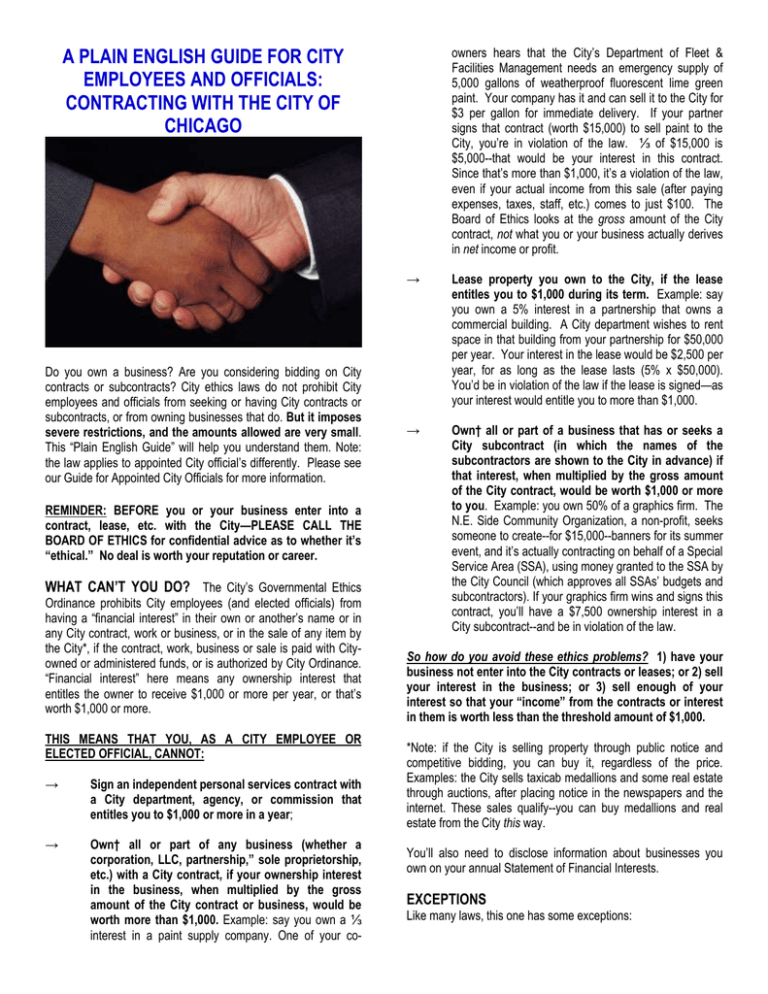A PLAIN ENGLISH GUIDE FOR CITY
advertisement

A PLAIN ENGLISH GUIDE FOR CITY EMPLOYEES AND OFFICIALS: CONTRACTING WITH THE CITY OF CHICAGO Do you own a business? Are you considering bidding on City contracts or subcontracts? City ethics laws do not prohibit City employees and officials from seeking or having City contracts or subcontracts, or from owning businesses that do. But it imposes severe restrictions, and the amounts allowed are very small. This “Plain English Guide” will help you understand them. Note: the law applies to appointed City official’s differently. Please see our Guide for Appointed City Officials for more information. REMINDER: BEFORE you or your business enter into a contract, lease, etc. with the City—PLEASE CALL THE BOARD OF ETHICS for confidential advice as to whether it’s “ethical.” No deal is worth your reputation or career. WHAT CAN’T YOU DO? The City’s Governmental Ethics Ordinance prohibits City employees (and elected officials) from having a “financial interest” in their own or another’s name or in any City contract, work or business, or in the sale of any item by the City*, if the contract, work, business or sale is paid with Cityowned or administered funds, or is authorized by City Ordinance. “Financial interest” here means any ownership interest that entitles the owner to receive $1,000 or more per year, or that’s worth $1,000 or more. THIS MEANS THAT YOU, AS A CITY EMPLOYEE OR ELECTED OFFICIAL, CANNOT: → Sign an independent personal services contract with a City department, agency, or commission that entitles you to $1,000 or more in a year; → Own† all or part of any business (whether a corporation, LLC, partnership,” sole proprietorship, etc.) with a City contract, if your ownership interest in the business, when multiplied by the gross amount of the City contract or business, would be worth more than $1,000. Example: say you own a ⅓ interest in a paint supply company. One of your co- owners hears that the City’s Department of Fleet & Facilities Management needs an emergency supply of 5,000 gallons of weatherproof fluorescent lime green paint. Your company has it and can sell it to the City for $3 per gallon for immediate delivery. If your partner signs that contract (worth $15,000) to sell paint to the City, you’re in violation of the law. ⅓ of $15,000 is $5,000--that would be your interest in this contract. Since that’s more than $1,000, it’s a violation of the law, even if your actual income from this sale (after paying expenses, taxes, staff, etc.) comes to just $100. The Board of Ethics looks at the gross amount of the City contract, not what you or your business actually derives in net income or profit. → Lease property you own to the City, if the lease entitles you to $1,000 during its term. Example: say you own a 5% interest in a partnership that owns a commercial building. A City department wishes to rent space in that building from your partnership for $50,000 per year. Your interest in the lease would be $2,500 per year, for as long as the lease lasts (5% x $50,000). You’d be in violation of the law if the lease is signed—as your interest would entitle you to more than $1,000. → Own† all or part of a business that has or seeks a City subcontract (in which the names of the subcontractors are shown to the City in advance) if that interest, when multiplied by the gross amount of the City contract, would be worth $1,000 or more to you. Example: you own 50% of a graphics firm. The N.E. Side Community Organization, a non-profit, seeks someone to create--for $15,000--banners for its summer event, and it’s actually contracting on behalf of a Special Service Area (SSA), using money granted to the SSA by the City Council (which approves all SSAs’ budgets and subcontractors). If your graphics firm wins and signs this contract, you’ll have a $7,500 ownership interest in a City subcontract--and be in violation of the law. So how do you avoid these ethics problems? 1) have your business not enter into the City contracts or leases; or 2) sell your interest in the business; or 3) sell enough of your interest so that your “income” from the contracts or interest in them is worth less than the threshold amount of $1,000. *Note: if the City is selling property through public notice and competitive bidding, you can buy it, regardless of the price. Examples: the City sells taxicab medallions and some real estate through auctions, after placing notice in the newspapers and the internet. These sales qualify--you can buy medallions and real estate from the City this way. You’ll also need to disclose information about businesses you own on your annual Statement of Financial Interests. EXCEPTIONS Like many laws, this one has some exceptions: ● Your relative’s independent business may have a financial interest in City contracts, work or business. If your daughter owns that paint firm, and it’s her independent business, it could have that $15,000 City contract. So how do you know whether a business is your relative’s independent business? It’s a fact-based test. Have you participated in the operation or management of the business? If yes, it’s not independent. For example, did you recently own it and sell your share to your daughter? Do you have authority to sign checks on the firm’s behalf? Those are factors showing that the business is not independent. But using your spouse’s business’s income for household expenses, or filing a joint tax return—those are not problems. (Note: under the City’s Personnel Rules, spouses and domestic partners of Mayoral staff may not have interests in persons or firm with sister agency business.) ● This prohibition applies only to contracts, work or business of the City of Chicago—not to contracts of “sister agencies.” Sister agencies include the Chicago Public Schools, Chicago Transit Authority, Park District, Public Building Commission, and Metropolitan Pier and Exposition Authority. These are all legally separate entities from the City, established under different parts of state law. The City’s ethics laws cover only City departments, agencies and commissions. BUT NOTE: be very careful with Public Building Commission contracts to build City facilities, because these are typically paid with City funds and thus covered by the limits. ● If you own stock in PUBLIC companies with City contracts, you will not violate the ethics law—as long as your stock is less than 1% of the company’s outstanding stock (even if your stock is worth more than $1,000). But note: if you acquired more than $15,000 of this company’s stock after November 1, 2012, you cannot manage this company’s City contracts. And, you could not: → Make, participate in or try to influence any City government decisions or matters that affect your outside employer or its City contract(s) or business; → Contact other City employees or officials on your outside employer’s behalf; → Receive any compensation or money for advising or assisting your outside employer on matters involving City business, unless those matters are “wholly unrelated” to your City job. PENALTIES City employees and officials who violate these prohibitions are subject to severe fines and employment sanctions, up to discharge or removal from office. The City can cancel a contract or subcontract awarded in violation and sue for monetary damages. Names of persons investigated and determined to have violated the law will be made public. We’ve seen employees get into trouble over this. Don’t chance it. Please call for advice. Questions? This Plain-English guide is intended to help you develop a basic understanding of the restrictions on owning a business that has or seeks City contracts business. It is not a substitute and cannot be relied on for legal advice. For authoritative, confidential advice in your particular situation, please consult with the Board of Ethics. CITY OF CHICAGO BOARD OF ETHICS 740 NORTH SEDGWICK, SUITE 500 CHICAGO, IL 60654 312-744-9660 sberlin@cityofchicago.org twitter: @EthicsSteve www.cityofchicago.org/Ethics WHAT IF YOU’RE JUST AN EMPLOYEE OR INDEPENDENT CONTRACTOR OF A BUSINESS WITH CITY CONTRACTS OR SUBCONTRACTS, BUT NOT AN OWNER? These restrictions on City contracting would not apply. They apply only to ownership interests. But: STEPHEN W. BEARD, CHAIR Steven I. Berlin, Executive Director Rahm Emanuel, Mayor → This would be outside employment, and you’d need to receive all required approvals before you begin (for example, from your department head). 4/15



